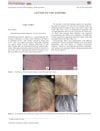Search
for
Sort by
Research
210-240 / 1000+ resultsresearch Minoxidil

research Chemotherapy-Induced Alopecia
Chemotherapy often causes hair loss, which usually grows back within 3 to 6 months, but there's no effective treatment to prevent it.
research Tackling Chemotherapy-Induced Alopecia
Chemotherapy-induced hair loss is a major concern, but various treatments show promise in preventing and reversing it.

research Alopecia and Hair Damage Induced by Oncological Therapy
Cancer treatments often cause hair loss and damage, affecting patients' mental health.

research Care for Alopecia During Chemotherapy of Cancer Patients
The document concluded that there were no effective ways to prevent hair loss from chemotherapy but treatments were being explored.

research In Other Journals: Summaries of Dermatological Studies from 2011
Cellulite may be linked to low adiponectin, isotretinoin with UVB can treat psoriasis effectively, permanent alopecia post-chemotherapy resembles a unique hair loss, deodorants may cause fragrance allergies, desmoplastic melanoma is becoming more common, and intensive UVB treatment can give long-term psoriasis remission.

research Management of Alopecia Due to Cancer Therapies
The document concludes that scalp cooling and treatments like minoxidil can help manage hair loss from cancer therapy.

research Chemotherapy-Induced Hair Loss: The Use of Biomarkers for Predicting Alopecic Severity and Treatment Efficacy
Scalp cooling to prevent hair loss from chemotherapy works for some but not all, and studying hair damage markers could improve prevention and treatment.

research The Effect of Parathyroid Hormones on Hair Follicle Physiology: Implications for Treatment of Chemotherapy-Induced Alopecia
Parathyroid hormones are important for hair growth, but their use in treating hair loss from chemotherapy is still uncertain.

research Monitoring Chemotherapy-Induced Alopecia With Trichoscopy
Chemotherapy caused hair loss with specific patterns, but most patients had hair regrowth after treatment, while some had lasting hair loss.

research Chemotherapy-Induced Anagen Effluvium: Diffuse or Patterned?
Chemotherapy can cause rapid, extensive hair loss, with patterns varying between individuals.

research Identifying the Supportive Care Needs of Men and Women Affected by Chemotherapy-Induced Alopecia: A Systematic Review
People undergoing chemotherapy need better support and information to cope with hair loss.

research A Natural Product That Accelerates Hair Growth in Women with Chemotherapy-Induced Alopecia
A lotion with natural extracts significantly sped up hair growth in women with hair loss from chemotherapy.

research The Role of Platelet-Rich Plasma in the Prevention of Chemotherapy-Induced Alopecia
Platelet-rich plasma doesn't prevent hair loss from chemotherapy, and mononuclear cells only help against hair loss from one specific chemotherapy drug.

research Chemotherapy-Induced Alopecia Management: Clinical Experience and Practical Advice
The conclusion is to use scalp cooling, gentle hair care, and treatments like minoxidil for managing hair loss from chemotherapy, and stresses the need for more research and collaboration in this area.

research Treatment and Prevention of Chemotherapy-Induced Alopecia with PTH-CBD, a Collagen-Targeted Parathyroid Hormone Analog, in a Non-Depilated Mouse Model
PTH-CBD could help prevent and treat hair loss caused by chemotherapy in mice.

research Drug-Induced Hair Disorders
Some drugs can cause hair loss, excessive growth, or color changes, often reversible but sometimes permanent.
research Scalp Hypothermia as a Preventative Measure for Chemotherapy-Induced Alopecia: A Review of Controlled Clinical Trials
Scalp cooling effectively reduces hair loss from chemotherapy.
research Cold Thermal Injury from Cold Caps Used for the Prevention of Chemotherapy-Induced Alopecia
Some patients using cold caps to prevent hair loss from chemotherapy got mild scalp injuries similar to frostbite.
research Transient Chemotherapy-Induced Alopecia After Intralesional 5-Fluorouracil Treatment of Keloids
Temporary hair loss can occur after 5-fluorouracil treatment for keloids.

research Evaluation of the CNC Prosthetic System in Recurrent Breast Cancer Patients With Chemotherapy-Induced Alopecia: A Pilot Study
The CNC® prosthetic system improved body image in breast cancer patients with hair loss from chemotherapy but did not significantly change their psychological wellbeing.

research Prevention and Treatment of Chemotherapy-Induced Alopecia
Scalp cooling can help prevent hair loss from chemotherapy, but treatment should be tailored to the individual and more research is needed.
research Determination of the Factors Affecting the Frequency of Chemotherapy-Induced Alopecia and Methods of Coping with Alopecia
Most women undergoing chemotherapy experience hair loss, and many cope by using wigs or bonnets.

research Effect of N-Acetylcysteine on Hair Follicle Changes in Mouse Model of Cyclophosphamide-Induced Alopecia: Histological and Biochemical Study
N-acetylcysteine may prevent hair loss caused by chemotherapy.

research Chemotherapy-Induced Alopecia: A Novel Observation
Some patients' hair grew back black and white after chemotherapy.
research The Utility of DHL-HisZnNa, a Novel Antioxidant, Against Anticancer Agent-Induced Alopecia in Breast Cancer Patients: A Multicenter Phase II Clinical Trial
DHL-HisZnNa may help reduce hair loss from chemotherapy, but more research is needed.

research iTRAQ-Based Quantitative Proteomics Revealing the Therapeutic Mechanism of a Medicinal and Edible Formula YH0618 in Reducing Doxorubicin-Induced Alopecia by Targeting Keratins and TGF-β/Smad3 Pathway
YH0618 helps reduce chemotherapy-induced hair loss by targeting specific proteins and pathways.

research Prevention of Alopecia in Medical and Interventional Chemotherapy Patients
Cold caps and certain drugs may help prevent or reduce hair loss from chemotherapy, but more research is needed.

research Permanent Alopecia After Cranial Irradiation: Dose–Response Relationship
Higher doses of cranial irradiation are linked to permanent hair loss.